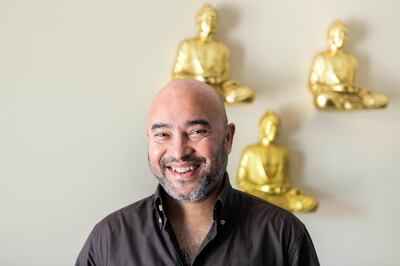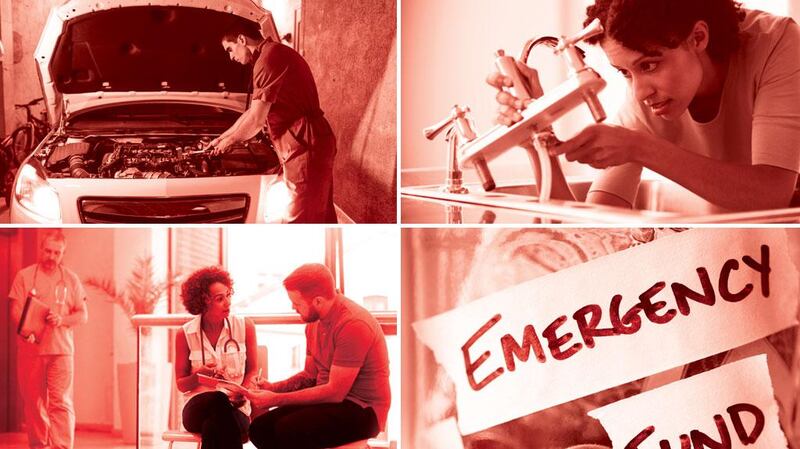Would you cope if you were hit with an unexpected bill for Dh1,500? What about Dh5,000? Or Dh15,000? Such bills could become frighteningly commonplace if you consider the likelihood of your car or air conditioning breaking down - or, in the worst case, receiving a massive medical bill that your insurer refuses to honour.
According to a recent survey by the payment solutions company, Payfort, nearly half of UAE residents are still in debt and 12 per cent are actively seeking a loan. More worryingly though is that almost three in 10 (27.8 per cent) say they are unable to save any money. And while 38 per cent set aside some funds, they can only save 10 per cent of their income a month.
Further afield, some 44 per cent of Americans say they would struggle to come up with just $400 (Dh1,469) to cover an unexpected expense, according to the US Federal Reserve, while surveys by The Pew Charitable Trusts found that half of families that did have $2,000 in saving would still find it hard to pay the bills after a financial shock.
And in England, housing charity Shelter found that 37 per cent of families would be unable to cover their housing costs for more than a month if one partner lost their job. Around 16.5 million working-age adults in the UK have no savings at all, according to government figures.
“Emergencies happen more often than any of us anticipate,” says Sam Instone, chief executive of financial advisory company AES International. “They are a fact of life. From a broken-down car to an unexpected medical bill, the only way forward is allowing for emergencies and getting financially positioned to cope with them."
Mr Instone warns that borrowing money to fund any emergency, or using a credit card to cover it, will mess up your budget and create greater stress. “The bottom line is, cut back as hard as you can to build an emergency fund as quickly as you can.
“Don’t go out socialising, don’t buy luxuries, don’t waste a single penny until that money is safely saved up. It’s the only way to alleviate some of the stress an emergency inevitably causes.”
So how much should you be putting aside to stop living from month to month and start budgeting for those not-so-unexpected bills?
Car repairs
US households spend around $837 (Dh3,074) on vehicle maintenance and repairs in 2015 (representing 1.4 to 1.8 per cent of their income), according to the US Bureau of Labour Statistics. But UAE experts say those living in the Emirates need more set aside.
Bill Carter, chief systems and innovation officer at Autodata Middle East, says it is best to buy a car with a service contract, which covers you for routine maintenance, although you will still need to budget for tyres, battery and emergency repairs. He suggests putting aside a minimum of Dh5,000 a year - more if you drive an SUV.
If you only intend to be in the UAE for a short period, it may be better to look at a short-term lease, he suggests. “That way you have a set monthly cost and all you have to pay extra is fuel.” If you are looking to stay for several years, you may need to think ahead to budgeting for your next car; in that case, it may be worth looking at deals where a car dealership will buy back the car after a set period and you can then use that money to fund a replacement, Mr Carter adds.
Manufacturers are starting to look at a new figure, TCO - the total cost of ownership, he says, which will help consumers make a “much more educated choice” when buying a new or used car. At present, people tend to get “carried away with the lifestyle here and lose track of the real cost of motoring,” he warns.

Home maintenance and repairs
Maintaining and servicing a home can cost £3,000 (Dh14,518) a year, according to the UK security services firm Keyholding Company, while in the US, home services website Angie’s List estimates that monthly maintenance costs vary from $25 - $83 (Dh92-305) a month depending on cost of labour in the area and the harshness of the weather.
A popular rule of thumb suggests you should budget $1 (Dh3.67) per square foot per year for maintenance and repair costs. For example, if you live in a 2,000-square-foot home, budget $2,000 (Dh7,345) a year as an annualised average over 10 years or more. That means you hope to average out at Dh7,345 a year – some years, your bills could run much higher, particularly if you live in an older property.
Ricky Jaiswal, the founder of Handyman Guru technical services, a Dubai maintenance company he set up in 2013, says annual maintenance contracts range from Dh3,000 a year for a two-bedroom villa to Dh8,000 for larger villas of up to four or five bedrooms. This generally equates to 3 to 8 per cent of the rental amount.
"It is like an insurance for the basic maintenance but you may have to pay for the cost of parts on top of that. The cost also depends on the area you live in and how old the house is. Older developments like The Springs have more wear and tear, compared to newer develops where the maintenance costs are low."
_____________
Read more:
Bounced cheques in UAE: new rules 'a progressive step for the justice system'
The Debt Panel: 'I bailed out my mum when my dad died and now owe over Dh240,000'
[ Seven in ten UAE residents unsure how to achieve their financial goals ]
[ 20 tips to get your finances back on track in the UAE ]
_____________
Mr Jaiswal says some tenants have maintenance costs covered by the landlord with the general rule that any costs under Dh500 are covered by the tenant and anything above that are covered by the landlord.
If you rent in the UAE, your landlord should have buildings insurance; it is a legal requirement. But it is worth having personal contents insurance, which can include accidental damage cover and protect you from liability to the landlord if you accidentally damage the property itself as a tenant. Yet, according to a survey by home online services marketplace, ServiceMarket, earlier this year, 90 per cent of people in Dubai do not have home insurance, with almost half saying they did not see the point as they were only renting.
Medical bills
Thanks to changes in the law, most UAE residents now have medical insurance, But many are still blithely unaware that there are many conditions that may not be covered - including innocuous but pre-existing ones at the time at which you took out your insurance. Even where you have insurance, there could be a cap on what is covered.
Additionally, too many people rely on basic coverage policies or “ignore or repress” potential health issues because they are worried about higher premiums, according to Talal Bayaa, the chief executive and co-founder of insurance comparison site Bayzat.
“The most common issue we see is avoidance when it comes to health insurance,” he says. “People are worried about higher premiums and frequently ignore or repress potential health alarms such as high blood pressure or thyroid problems. People don't inform their insurance providers of them beforehand; however, these minor medical details might grow into serious problems later. It's always best to declare these before applying to ensure that, should something manifest, you're covered."
Another prevailing issue is the reliance on basic coverage, he says. "People are very keen to invest in policies that cover all basic needs, but we find that people adopt these plans without realising their limitations.”
If you take maternity coverage, he says, basic plans will not be sufficient to cover complications and additional costs in maternity or post-natal care. A healthy and “perfect” pregnancy might “just” be covered by the Dh7,000 natural birth and Dh10,000 Caesarean section limits – but that only covers eight visits during pregnancy and three ultrasounds.
Without an adequate plan, you could fork out Dh140,000 or more to cover neonatal intensive care for a premature baby. According to the World Health Organisation 15 million babies are born pre-term, before 37 weeks of gestation, every year - and 10 per cent of all deliveries in the UAE are premature.
Your insurer is also unlikely to cover dental or eye care, or vaccinations. Other exclusions, says Mr Bayaa, include hospital and clinic registration fees, cosmetic surgery and nasal septum deviation.
Emergency funds
Steve Cronin, the founder of Wise (WiseUAE.com), a non-profit community for expat investors, recommends three types of emergency fund for UAE expats: the airport fund, the local emergency fund and the international emergency fund.
The airport fund is as simple as putting aside five Dh100 notes to get to the airport in an emergency, he says. Keep the money with your passport and make it easy to get at, as it’s also your survival fund if you cannot access your home.
The local emergency fund should cover three months of major expenses (six if you have a job “so specialised or competitive that it would be hard to find another”) such as rent, car, credit card or loan payments and utilities. If you have a partner or dependent children you should be “especially careful” about this fund, Mr Cronin says, and it will also cover “unexpected hits” like hospital or vet bills.
A week’s worth of expenses should sit in your current account or instant access savings and you should be able to gain access to the rest in one to three days - keeping it all very liquid. If you invest in stock or bond exchange-traded funds (ETFs), “you run the risk of the investment’s value being down at the time you need to convert it back to cash.”
Many expats keep an account in their home country too, Mr Cronin says; or else open one offshore. Keep enough there to survive a week in case your UAE cards do not work for any reason. This fund is also good if you have problems on holiday.
Finally, when you do use up your emergency fund, adds Mr Instone - “because you will one day” - build it straight back up again. “It’s nothing but a headache, but it is critical for your long-term stability,” he says.






